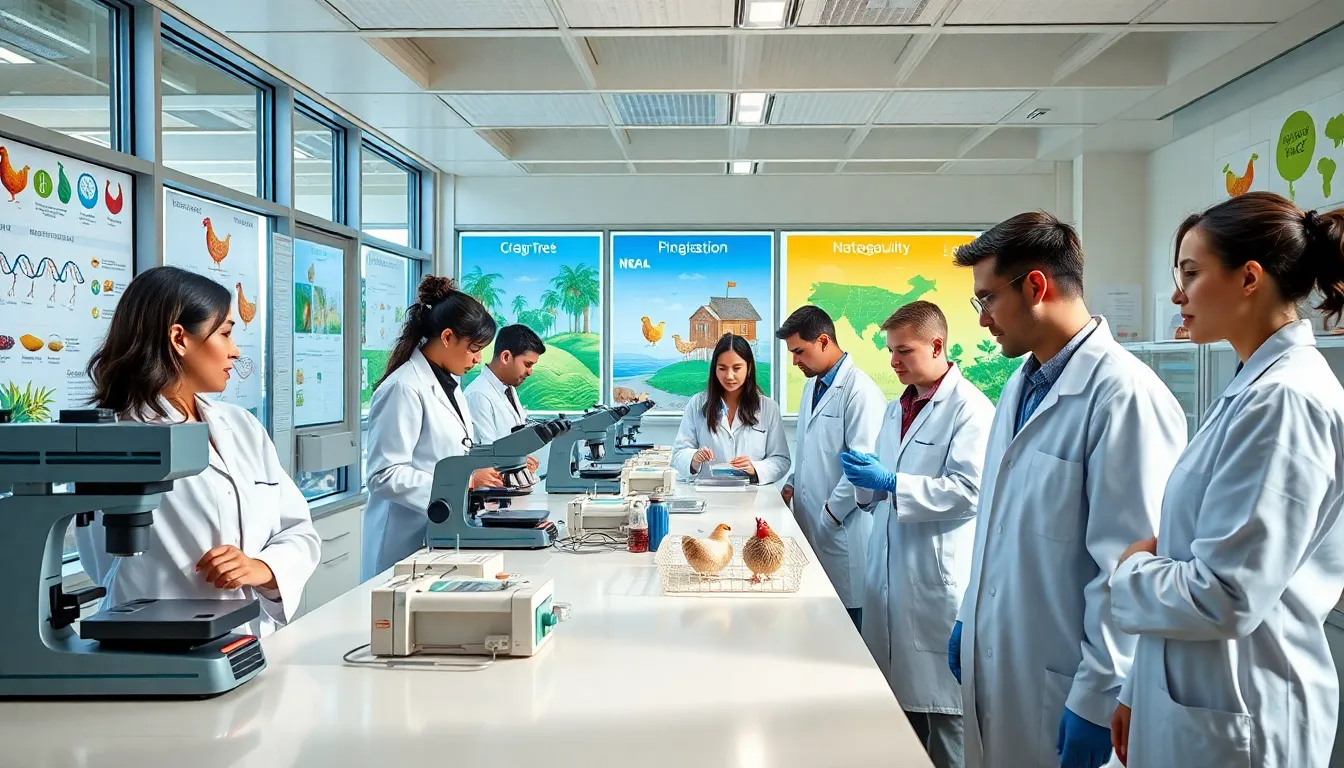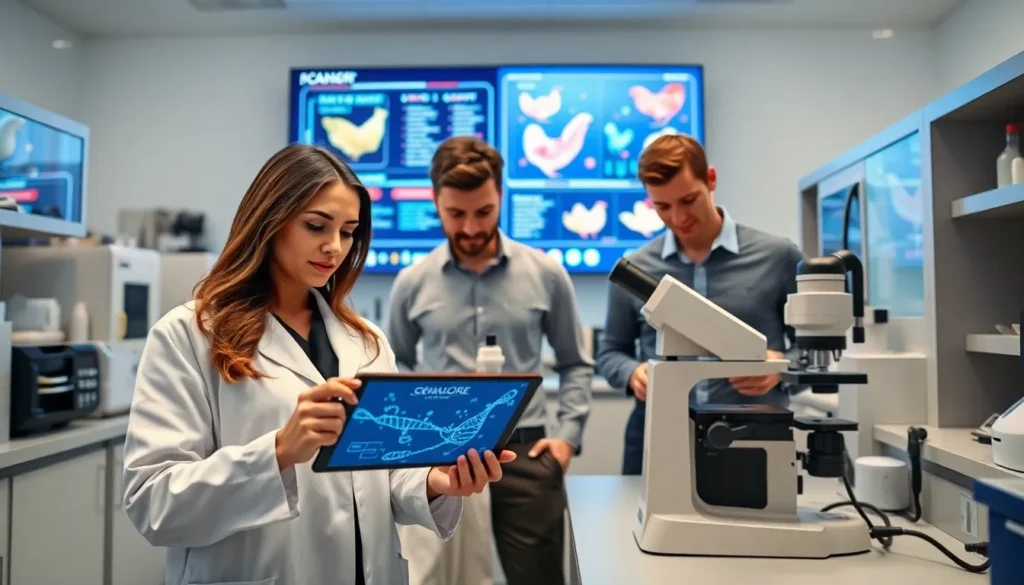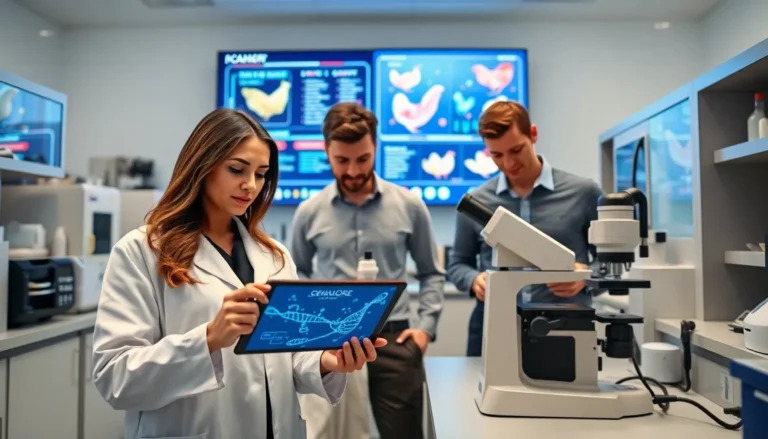Ever wondered how poultry producers keep their flocks healthy while ramping up production? Welcome to the world of avian biotech, a game changer in the poultry industry. Imagine genetic engineering and cutting-edge vaccination technologies working together like a well-rehearsed dance, all to ensure that you get the freshest eggs and chicken on your plate. With its ability to combat diseases and optimize production efficiency, avian biotech is the secret ingredient you didn’t know you needed. Buckle up as we take a deep jump into this fascinating field that’s soaring to new heights.
Table of Contents
ToggleUnderstanding Avian Biotech

Avian biotech refers to the innovative application of biotechnology in the poultry sector. This field combines genetics, molecular biology, and other technologies to improve bird health and productivity. By utilizing advanced genetic techniques, scientists aim to enhance desirable traits in poultry, leading to healthier birds and more productive farming practices. The industry has embraced these technologies, transforming traditional practices into more efficient operations. With a significant focus on sustainability, avian biotech plays a crucial role in meeting global food demands while minimizing environmental impacts.
From breeding faster-growing chickens to enhancing disease resistance, avian biotech involves various strategies. As poultry production faces challenges like outbreaks of avian influenza or other infectious diseases, biotechnology offers solutions that can mitigate these risks. So, the role of avian biotech cannot be overstated, it is crucial for achieving long-term sustainability in poultry farming.
The Role Of Genetic Engineering In Poultry
Genetic engineering stands at the forefront of avian biotech, propelling the industry into a new era. Through the manipulation of an organism’s DNA, scientists can introduce specific traits that enhance health and growth in poultry. For instance, genetically modified (GM) birds can exhibit traits such as faster growth rates and improved feed efficiency. This not only benefits producers by reducing costs but also consumers by increasing the availability of poultry products.
Consider the example of transgenic chickens that can resist certain diseases. By inserting genes that confer resistance to viruses like avian influenza, producers can significantly decrease mortality rates in flocks. This advancement reflects a proactive approach to disease management, eventually leading to safer poultry products in the market.
But, genetic engineering isn’t without its controversies. While the benefits are promising, the public often has concerns about the safety of GM foods. Addressing these concerns transparently is vital for gaining consumer trust. Regulatory bodies must thoroughly evaluate these technologies to ensure their safety and efficacy before they hit the market.
Advancements In Vaccination Technologies
Recent advancements in vaccination technologies have marked a pivotal change in how poultry health is managed. Traditional vaccines often required multiple doses and sometimes resulted in incomplete immunity. Newer technologies, such as recombinant vaccines and vectored vaccines, offer more effective solutions. These vaccines can specifically target pathogens while minimizing adverse reactions in birds.
For instance, vectored vaccines use harmless viruses to deliver genes encoding antigens from the target pathogen. This means that once vaccinated, chickens can develop an immune response against specific diseases like Newcastle disease or infectious bursal disease. Such cutting-edge innovations not only enhance the efficiency of vaccination programs but also reduce overall use of antibiotics, promoting healthier livestock.
Applications In Disease Resistance And Management
Disease resistance in poultry remains a top priority for producers and researchers alike. Avian biotech brings an arsenal of strategies to manage and combat diseases effectively. Genetic selection for disease resistance is a powerful approach: through selective breeding, producers can develop flocks that showcase natural resilience against common poultry diseases.
Besides, biotechnological interventions such as gene editing tools like CRISPR offer unprecedented precision in modifying genetic traits associated with disease resistance. By identifying and editing specific genes, scientists can create birds that are not only healthier but also more robust in the face of outbreaks. This is particularly crucial as the global poultry industry faces increasing disease pressures due to climate change and intensified farming practices.
Also, the adoption of data analytics and artificial intelligence in poultry management complements these advancements. By analyzing health data, producers can identify potential issues before they escalate, ensuring timely intervention and maintaining flock health.
Ethical Considerations And Regulatory Challenges
As innovative as avian biotech is, it does come with its share of ethical considerations and regulatory challenges. Public perception of genetic modifications can sometimes lead to aversion, with consumers hesitant to embrace genetically engineered poultry products. Education and transparency are key to overcoming these hurdles. Engaging with the public and stakeholders about the benefits of avian biotech is essential.
Future Trends In Avian Biotech
Looking to the future, avian biotech is poised to take even more exciting directions. As technologies continue to evolve, researchers are exploring the potential of artificial intelligence in breeding decisions. The use of big data for genomic selection will help in predicting and selecting traits more accurately, leading to improved performance. Also, advancements in microbiome research are opening doors to enhancing gut health, which can boost overall bird well-being.
Besides, as global populations grow, the demand for sustainable poultry production will intensify. Avian biotech will play a significant role in developing sustainable practices that balance productivity with environmental stewardship. These future trends suggest a dynamic shift towards integrating technology with ethical farming, paving the way for a healthier poultry industry.










